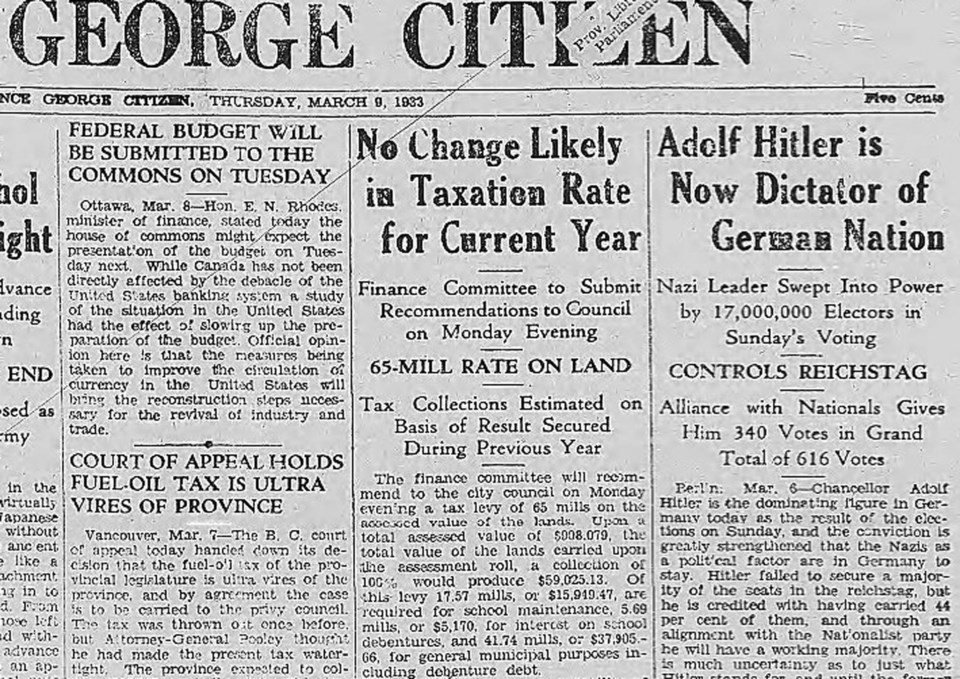This week in history, March 6-12:
March 9, 1933: The Citizen reported that on March 6, 1933, Adolf Hitler and his Nazi party won 44 per cent of the seats in the German Reichstag. After forming a coalition with the Nationalist Party, Hitler had a functioning majority in the German national parliament.
"There is much uncertainty as to just what Hitler stands for, and until the former Austrian sergeant secures control definitively in his own hand he may not fully disclose his own program," The Citizen reported.
There were already concerns raised about the fairness of the election, as Hitler did not allow opponents of his party to advertise on German radio stations and many Communist Party leaders were arrested during the course of the campaign, The Citizen said.
The Citizen also reported that while Hitler's agenda was largely hidden, his chief political ally, Nationalist Party leader Alfred Hugenberg, was known for anti-democratic, militant polices.
"He (Hugenberg) is likely to become the most disturbing factor in Europe," The Citizen reported. "Compared to him, Chancellor Hitler is a Conservative."
Well the good news is we've learned from history. A major, Western country would never elect a right-wing demagogue with a history of racist and authoritarian statements on a platform of vague promises to restore national pride these days, right?
March 12, 1919: The Grand Trunk Pacific Railway officially went into receivership on March 10, 1919, The Citizen reported. The railway, which connected Prince Rupert to Winnipeg, was only completed on April 7, 1914 when the last spike was driven a mile east of Fort Fraser.
The railway had arrived in Fort George on Jan. 27, 1914. The railway company founded its own town site in between the existing towns of Central Fort George and South Fort George - a town they named Prince George.
According to The Citizen report, Railway Minister Dr. Reid was appointed the receiver for the defunct railway. The company's ownership remained responsible for the nearly $123.3 million in guaranteed bonds issued by the company, the report added.
SPOILER ALERT: In the third season of the popular British TV show Downton Abbey, Robert Crawly loses the family fortune in the Grand Trunk bankruptcy. So Downton Abbey has a link to downtown Prince George.
March 12, 1920: Shipbuilder Dan McFee and sternwheeler captain O.F. Browne arrived in Prince George to attempt repairs on the BX sternwheeler, The Citizen reported.
The big steamer was wrecked 40 miles south of Prince George on the Fraser River in August 1919, the report said. McFee was the designer of the BX, while Browne was her captain on Aug. 28, 1919 when she departed South Fort George headed south with passengers and 70 tons of cargo. She struck a submerged rock near Woodpecker Island, taking what seemed at first to be minor damage.
However, the bulkheads below the waterline later collapsed, causing the BX to sink onto a sandbar.
McFee and Browne planned to oversee the repair of the BX's hull and bring her back to Prince George for more extensive repairs, The Citizen reported.
The BX would eventually be repaired and pushed upstream by her sister ship, the BC Express, back to Prince George. However, she never navigated the Fraser again, and the BC Express was retired in November 1920 - marking the end of the era of steamships on the Fraser River. But at least the BX got a pub named in its honour, so that's something.
March 11, 1948: There was a clash of religions in Prince George in 1948, after the Prince George Ministerial Association called on city council to ban hockey on Sunday.
In a letter to city council, the association cited the Lord's Day Act and said that both hockey and ice skating on Sundays was competing with attendance at Sunday church services. In addition, they were concerned that regular admission fees were being collected at the skating rink and hockey arena on Sundays, and it could lead to the total commercialization of the day.
A delegation of three local priests also appeared before city council, to press their case, The Citizen reported.
Mayor Jack Nicholson pointed out that, while it was clearly illegal, playing hockey on Sundays was a long-accepted practice in the community because of the long distances teams had to travel to play here, The Citizen reported.
City council passed a motion to take the matter under consideration.
Banning hockey? Not a good idea for any local politician wanting to be reelected. But it could make a good plot for a Canadian adaptation of Footloose.



